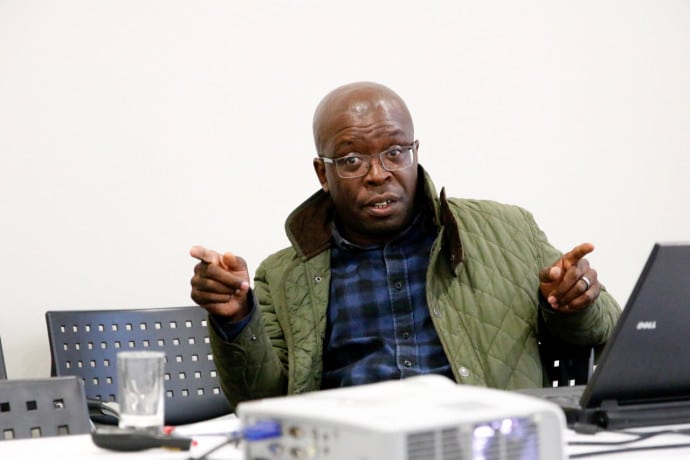“Devil With Blue Eyes is a novel of dislocation that seeks to explore and expose the rise of xenophobia in South Africa,” said journalist and author Fred Khumalo. “It also seeks to interrogate post-apartheid complexity.”

Khumalo gave STIAS fellows a tantalising glimpse into and reading from his latest work in progress Devil with Blue Eyes which he is currently working on at STIAS.
He described it as “challenging to present in its early stages” and admitted that the contemporary theme means he is “shooting at a moving target”.
The novel will aim to encompass the themes of migration, race and identity, and their interactions with each other. It will do so through the eyes of a 16-year old girl, Fikile Gumede – “an American-born, bi-racial, teenage girl – her mother is a white American and her father a black South African – who has to finish her schooling in her father’s country after the father dies in a car accident, and her mother breaks down and is hospitalised”.
In so doing she moves from an upper middle-class suburb in Boston in the USA to the vibrant, modern African city of Johannesburg. And, although she lives in the secure, upper-class suburb of Houghton where she is protected by high walls and chauffeur-driven cars, she finds a country “engulfed in the flames of xenophobia”. Despite being educated and well informed about current events “she wasn’t ready to be confronted with this”.
Khumalo indicated that he has been developing the idea of a novel about xenophobia since witnessing first-hand xenophobic incidents while field reporting in 2008. However, deciding how to tell the story was a challenge. “I decided on using an ‘outsider’ because South Africans are often desensitised to the realities around them but foreigners see things with new eyes.”
“South Africans have always had a sense of exceptionalism – of isolation, of being a vehicle of light in the ‘Dark Continent’. Civil wars and economic challenges happen elsewhere in Africa. But 23 years after liberation we have to see that we are part of the continent and face the same challenges. We should have learnt from how other countries grappled with post-colonial challenges.”
“The post-apartheid South Africa that Fikile arrives in is a complicated country, which calls her identity, her essence, her preconceived ideas into question,” said Khumalo. “Fikile comes with the baggage of being a bi-racial girl in the US. She has a Zulu name but speaks with an American accent and has blue eyes. She is transported into a country with its own deep-rooted racial identity issues.”
The story is set in 2015 during the second explosion of xenophobic violence which also allows Khumalo to examine the issues of the explosion of the ‘Fallist’ movement and “harvest current social dynamics”.
“The Fallist movement with Fees Must Fall, Rhodes Must Fall, etc. reached a pinnacle from 2015 onwards,” said Khumalo. “This has led to an explosion of political activism, gender activism, a reinterpretation of what it means to be black, and a new interpretation of Black Consciousness.”
“It is also a movement of young people. Those who were often previously seen as apathetic and uninvolved.”
“Fikile is coming of age, coming out of her comfort zone and is witnessing a chapter of South African history unfolding. South Africa is also coming of age, snapped out of the endless euphoria of the Rainbow Nation.”
But he is quick to add: “This is not a political treatise. It’s about a teenager trying to make sense of a new world and being caught in a vortex of physical and emotional challenges. It will highlight the contrasting worlds that a young woman is trying to navigate physically and psychologically.”
Fikile is confronted with the realities of xenophobia both by witnessing an attack in Soweto and by hearing her relatives argue about it at home. The story is told in third-person narrative as well as through blog posts written by the protagonist. And Khumalo admits to relying on his teenage daughters to ensure the voice of Fikile is an authentic one. “They are quick to tell me when something is ‘so yesterday’,” laughed Khumalo.
The novel will also dip into issues of gender activism, of culture and into the new debates around bi-racialism in South Africa. “I want to raise questions and escalate the new bi-racialism debate to new levels,” he continued. “We speak of South Africa as a post-racial society but it is not.”
“I see myself as a social activist. I’m not pursuing art for art’s sake. I choose my topics carefully and I think it’s the right time to write this story,” said Khumalo.
Michelle Galloway: Part-time media officer at STIAS
Photograph: Christoff Pauw
